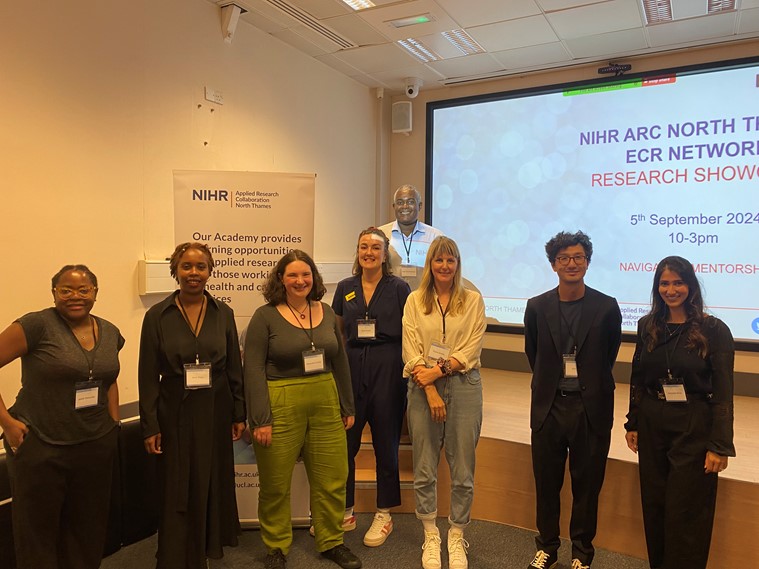
A photo of some of the speakers and attendees at the ECR showcase event
Our Early Career Researchers (ECR) network was established to provide a supportive and inclusive space for peer support for researchers, students, health and care professionals and those working in applied health research. It provides opportunities for members to develop wider academic skills and networks. Jess Wright, our Training and Engagement Coordinator, reflects on our recent ECR Showcase Event.
An early career researcher (ECR)'s journey is one of discovery, learning and growth.
Along the way, the right mentorship can offer guidance that shapes the trajectory of your research, as well as help build the confidence and resilience you need to navigate a complex academic landscape.
Given the importance of mentorship, we gave it centre stage at our recent NIHR ARC North Thames Early Career Researcher Showcase 2024. There, early career researchers shared their experiences of how mentorship has been integral to their progress and success.
Three key themes emerged throughout the day: the importance of building networks, mentorship beyond the academic sphere, and the power of empathy.
Below are reflections on these themes, including insights from our speakers.
1. Focus on building networks
One of the clearest messages that came through from the speakers was the immense value in a researcher’s career of building networks – both formal and informal.
In her keynote speech, Nicola Armstrong, Nurse Consultant at Essex Partnership University NHS Trust, emphasised that “mentorship is key to widen your networks” and highlighted how her own mentorship experiences have not only benefited her personally but also extended to her team and the wider community she supports.
For ECRs, the connections formed through mentorship can open doors to collaborative projects, provide access to diverse perspectives, and even offer emotional support. As Peris Thuo, Deputy Head of the British Academy ECR Network, echoed, “The network offers ECRs people they can talk with.”
Growing connections is one of the reasons why we established the NIHR ARC North Thames ECR network. We know networking can be daunting, though. So at the event we offered a chance to get some practice in with a speed-mentoring activity. Speaking about that session, one attendee said: “I was worried as didn’t know what to discuss but I actually really enjoyed the networking. It gave me a boost to speak to clinical academics who aren’t medics.”
Then, and throughout the day, it was great to see participants actively engaged in discussions and sharing their contact details, laying the groundwork for future partnerships.
By connecting with peers, senior researchers, and other professionals across different fields, ECRs can diversify their knowledge base, gain new insights, and ultimately broaden the scope and impact of their research.
2. Consider mentorship beyond academia
While many ECRs might initially focus on finding an academic mentor, the showcase highlighted that effective mentorship can come from a range of sources.
As Dr Alex Tsui, Consultant Academic Geriatrician and NIHR ARC North Thames Dementia Research Fellow, pointed out, “There are different mentors – academic, professional, pastoral – who will impact you in different ways.” He encouraged participants to seek mentorship not only from academics but also from professionals outside of academia, such as entrepreneurs and those in the creative arts, who offer a different perspective on problem-solving and innovation.
This broader view of mentorship seemed to resonate with many of the attendees, as it acknowledged the diverse skill-sets needed for a successful career in research today.
For example, Dr Tsui mentioned how pastoral mentorship – focused on personal and emotional well-being – can be as crucial as academic guidance, particularly during challenging times in a person's research journey.
It was a reminder that mentorship is not a one-size-fits-all relationship and that ECRs should feel empowered to seek support from multiple sources.
3. Champion empathy to create a supportive research environment
Empathy is often a defining quality in successful mentor-mentee relationships. As highlighted by Peris Thuo, empathy is “helpful for both the ECRs and the more senior academics”. She noted that mentoring relationships built on empathy can foster mutual understanding and support.
Empathy allows mentors to better understand the unique challenges faced by ECRs, especially those who might feel isolated or overwhelmed by the pressures of academia. Fiona Jenkins, a Health Coach for East London NHS Foundation Trust and former ARC North Thames Mental Health Research for All Intern, spoke about the encouragement she received during her journey: “Feeling that they believed that I could do it,” she shared, really mattered to her – underscoring how mentorship grounded in empathy can build confidence and resilience.
Empathy also plays a crucial role in ensuring that the mentoring process is inclusive and supportive of diverse research paths and personal circumstances, creating a nurturing environment in which ECRs can thrive.
Sharing the path forward
The experiences and insights shared at ARC North Thames ECR Showcase 2024 highlighted that the benefits of mentorship can be greater than the sum of its parts. As Nicola Armstrong put it, “mentorship helped me, the people on the programme, and the wider community.”
It is in the spirit of sharing that our ECR Network was created, and why we hold events like this. So it was great to see positive feedback from attendees, one of whom stated: "I really liked the talks from diverse speakers and the transparency of the speakers”.
As the ARC North Thames ECR Network continues to grow, fostering these themes of mentorship will be essential in supporting the next generation of researchers. Whether through formal mentorship programmes or informal networks of peers, the showcase reminded us that no one should embark on this journey alone.
Want to hear about events like this, and other updates from our ECR network? Subscribe for email updates.

 04 Nov 2024
04 Nov 2024